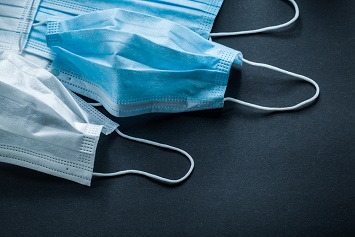The California Division of Occupational Safety and Health (Cal/OSHA) issued interim guidance requiring healthcare facilities to provide surgical masks during the COVID-19 pandemic when respirators are not available. The California Aerosol Transmissible Diseases (ATD) standard requires the use of respiratory protection for workers exposed to airborne infectious diseases.
However, the COVID-19 pandemic has resulted in a shortage of N95 filtering facepiece respirators. COVID-19 is a respiratory disease caused by the SARS-CoV-2 virus, first identified in Wuhan City, China, in December 2019. All approved respirators are certified by the National Institute for Occupational Safety and Health (NIOSH).
Covered employers must provide surgical masks when the respirator supply is insufficient for anticipated surges or when efforts to optimize the efficient use of respirators have not resolved respirator shortages.
Surgical masks can only be used for lower-hazard tasks involving patient contact, but NIOSH-certified powered air-purifying respirators (PAPRs) must be used during high-hazard tasks and aerosol-generating procedures. N95 respirators may be used for high-hazard tasks when PAPRs are unavailable due to a surge.
When employers use surgical masks instead of respirators, they must certify that full compliance with the ATD standard would exhaust respirator supplies needed to address an existing or anticipated surge, despite reasonable efforts to obtain additional respirators and maximize existing respirator supplies.
Once respirator supply chains are restored, employers must fully comply with the ATD standard, including respirator requirements.
When respirators are not available, employers must ensure compliance with all other provisions of the ATD standard, including:
- Ensuring source control procedures are in effect, such as masking of suspected and confirmed COVID-19 patients unless not possible for medical reasons;
- Maintaining work practices that minimize the number of employees exposed to infectious aerosols;
- Ensuring surgical masks are not used for high-hazard, aerosol-generating procedures or for collecting nasal or throat swab specimens;
- Contacting the local emergency management agency to access stockpiled respirators from local, state, and federal supplies;
- Training employees on additional precautions to use when respirators are not available to care for suspected and confirmed COVID-19 patients; and
- Informing employees and their representatives that the changes are per the Centers for Disease Control and Prevention (CDC) guidance, which are in effect until respirator stockpiles can be restored and keeping them updated on status changes.
The ATD standard applies to hospitals and other healthcare facilities, as well as correctional facilities, diagnostic laboratories, and police and public health services.
Conserving Respirator Supplies
Employers also must implement practices for conserving existing supplies of respirators, which may include:
- Using nondisposable respirators, such as elastomeric half-mask, full-facepiece, and PAPRs that can be disinfected and reused multiple times, instead of filtering facepiece respirators;
- Using filtering facepiece respirators for extended periods, allowing healthcare workers to keep the same respirator on during encounters with several patients without removing the respirator between patient encounters, while ensuring respirators are kept clean, sanitary, and in good working order at all times;
- Developing policies for reusing filtering facepiece respirators and training employees in procedures for removing, sanitizing, storing, inspecting, and redonning respirators;
- Using industrial N95 respirators certified for healthcare use, filtering facepiece respirators past their expiration date, and respirators certified to a foreign standard; and
- Allowing employees to wear their own personal protective equipment (PPE) if it complies with Cal/OSHA respiratory protection standards.
NIOSH certifies all respirators and tests N95 respirators intended for healthcare use to satisfy Food and Drug Administration (FDA) testing requirements. Industrial respirators are not tested to meet FDA requirements.
While there is a federal Bloodborne Pathogens (BBP) standard, there is no federal standard for airborne pathogens.

